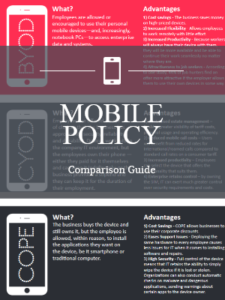What is BYOD?
Bring your own device is a business policy of employees bringing personally-owned mobile devices to their place of work and using those devices to access privileged company resources such as email, file servers and databases as well as their personal applications and data.
BYOD is one of the biggest trends sweeping the employment landscape today and is causing some of the biggest headaches for IT decision makers. Employees are becoming more accustomed to having newer technologies at their fingertips due to increasing smartphone and tablet use. Because of this, many of these employees want the choice of using these same technologies in the workplace.
Having BYOD policies can provide many advantages for both organisations and employees, but some concerns can also come with these benefits.
Advantages
1) Cost savings- A business that adopts a BYOD policy allows itself to save money on high-priced devices that it would normally be required to purchase for their employees. Employees may take better care of devices that they view as their own property
2) Increased Flexibility -Allowing workers to bring their own devices into the workplace can drastically increase workplace flexibility and worker productivity. For organisations that still utilise desktop computers, a BYOD policy would allow for workers to work remotely with little effort. If certain employees travel for work, they won’t be required to haul along multiple devices to satisfy their personal and work needs because they will have everything they need in one device.
3) Increased Productivity- Because workers will always have their device with them, whether it be at work or at home, they will be more available and be able to continue their work seamlessly no matter where they are. If an employee needs to leave work early for a doctor’s appointment or a child’s soccer game, they will be able to continue their work at home instead of stopping once they leave the office. Eliminating barriers between home and work will allow employees access to all necessary information and can lead to increased work productivity as a result.
4) Attractiveness to job seekers– Having an organisational BYOD policy can potentially lead to job prospects choosing your company over another. According to one study, 44% of job hunters find an offer more attractive if the employer allows them to use their own devices in some way. A defined BYOD policy can be a big selling point when trying to hire top talent and give organisations a hiring advantage over their competition.
Disadvantages
1) Data Security –This could be the biggest worry organisations have about implementing a BYOD system. Letting employees use their own devices for work purposes can lead to pertinent company data being compromised. The problem IT decision makers are encountering is trying to find the best method to allow users to access all data necessary while keeping that data safe and secure. Since BYOD is a relatively new concept for organisations, there isn’t a clear-cut best policy or practice for maintaining organisational data security. Organisations are beginning to establish guidelines and policies to better manage BYOD security, but determining which is best for the organisation may incur unwanted costs.
2) Cost – Yes we did mention earlier that BYOD could save you money, but for the 60% of organisations still purchase the devices for the employees it can actually be more costly. Having to pay for the device and also the data plans that go along with the devices can actually raise the cost for the organisation. Also, trying to implement guidelines and security for the devices can end up costing the organisation more than they originally planned for when they implemented the BYOD system.
3) Privacy –Most employees are onboard with the idea of bringing their own device for work purposes, but many of them worry about their own privacy. The computer they use for work will also be the same computer they surf the web with or use to log into Facebook and Twitter. Because of this, employees are wary about being “spied” on and their personal passwords, websites, and information compromised.
4) What happens when an employee leaves? – Since employees would be using their own devices, organisations worry about retrieving all company data and information if the employee were to quit or get fired. One commonality among organisations is educating employees and having them sign official BYOD policy forms outlining what employees can and can’t do on their own devices. Also, most organisations choose to only allow company related information to be saved and edited on their own servers or require employees to use a secure cloud-based sharing software such as Dropbox to share and edit documents.
Top BYOD Tips for Businesses
1) Recognise that BYOD is the latest offshoot of general network security. Companies should go back to basics ensuring they have robust security provisions and develop from there.
2) Consider why BYOD is necessary for your organisation. Who needs access and for what? Identify these crucial elements and build a policy from there.
3) Practically speaking, businesses can:
- Remove access to corporate information that can be copied from network computers onto portable devices
- Silo the data to create data pools of specific data sets
- Limit access to these data pools
What next?
To see our news article on the top 10 Best Practices for BYOD click here
Get in touch
Want to know more about how this could work for you? Get in contact with us and we’ll carry out a free of charge audit on your telecoms and recommend the best approach for you.
email info@spectrum-coms.co.uk or call 0844 856 3301 today.
Find out more about our Audit Services.

